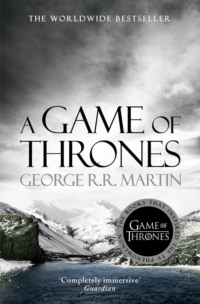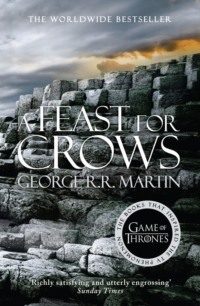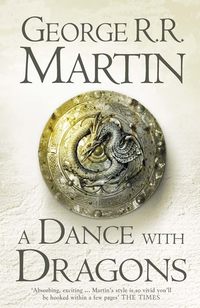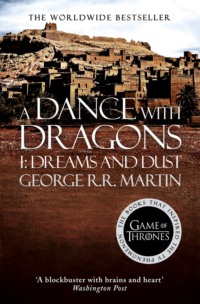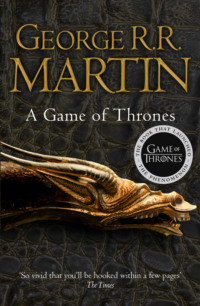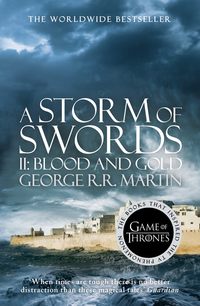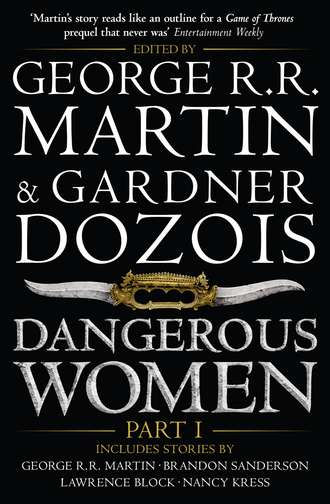
Полная версия
Dangerous Women. Part I
The ceremony went on all through that night. It was well past dawn when Rhaenyra Targaryen rose and made her descent. “And as her lord husband Prince Daemon escorted her from the hall, cuts were seen upon Her Grace’s legs and the palm of her left hand. Drops of blood fell to the floor as she went past, and wise men looked at one another, though none dared speak the truth aloud: the Iron Throne had spurned her, and her days upon it would be few.”
All this came to pass even as Prince Aemond and Ser Criston Cole advanced upon the riverlands. After nineteen days on the march, they reached Harrenhal … and found the castle gates open, with Prince Daemon and all his people gone.
Prince Aemond had kept Vhagar with the main column throughout the march, thinking that his uncle might attempt to attack them on Caraxes. He reached Harrenhal a day after Cole, and that night celebrated a great victory; Daemon and his “river scum” had fled rather than face his wroth, Aemond proclaimed. Small wonder then that when word of the fall of King’s Landing reached him, the prince felt thrice the fool. His fury was fearsome to behold.
West of Harrenhal, fighting continued in the riverlands as the Lannister host slogged onward. The age and infirmity of their commander, Lord Lefford, had slowed their march to a crawl, but as they neared the western shores of the Gods Eye, they found a huge new army athwart their path.
Roddy the Ruin and his Winter Wolves had joined with Forrest Frey, Lord of the Crossing, and Red Robb Rivers, known as the Bowman of Raventree. The northmen numbered two thousand, Frey commanded two hundred knights and thrice as many foot, Rivers brought three hundred archers to the fray. And scarce had Lord Lefford halted to confront the foe in front of him when more enemies appeared to the south, where Longleaf the Lionslayer and a ragged band of survivors from the earlier battles had been joined by the Lords Bigglestone, Chambers, and Perryn.
Caught between these two foes, Lefford hesitated to move against either, for fear of the other falling on his rear. Instead he put his back to the lake, dug in, and send ravens to Prince Aemond at Harrenhal, begging his aid. Though a dozen birds took wing, not one ever reached the prince; Red Robb Rivers, said to be the finest archer in all Westeros, took them down on the wing.
More rivermen turned up the next day, led by Ser Garibald Grey, Lord Jon Charlton, and the new Lord of Raventree, the eleven-year-old Benjicot Blackwood. With their numbers augmented by these fresh levies, the queen’s men agreed that the time had come to attack. “Best make an end to these lions before the dragons come,” said Roddy the Ruin.
The bloodiest land battle of the Dance of the Dragons began the next day, with the rising of the sun. In the annals of the Citadel it is known as the Battle by the Lakeshore, but to those men who lived to tell of it, it was always the Fishfeed.
Attacked from three sides, the westermen were driven back foot by foot into the waters of the Gods Eye. Hundreds died there, cut down whilst fighting in the reeds; hundreds more drowned as they tried to flee. By nightfall two thousand men were dead, amongst them many notables, including Lord Frey, Lord Lefford, Lord Bigglestone, Lord Charlton, Lord Swyft, Lord Reyne, Ser Clarent Crakehall, and Ser Tyler Hill, the Bastard of Lannisport. The Lannister host was shattered and slaughtered, but at such cost that young Ben Blackwood, the boy Lord of Raventree, wept when he saw the heaps of the dead. The most grievous losses were suffered by the northmen, for the Winter Wolves had begged the honor of leading the attack, and had charged five times into the ranks of Lannister spears. More than two thirds of the men who had ridden south with Lord Dustin were dead or wounded.
At Harrenhal, Aemond Targaryen and Criston Cole debated how best to answer the queen’s attacks. Though Black Harren’s seat was too strong to be taken by storm, and the river lords dared not lay siege for fear of Vhagar, the king’s men were running short of food and fodder, and losing men and horses to hunger and sickness. Only blackened fields and burned villages remained within sight of the castle’s massive walls, and those foraging parties that ventured further did not return. Ser Criston urged a withdrawal to the south, where Aegon’s support was strongest, but the prince refused, saying “Only a craven runs from traitors.” The loss of King’s Landing and the Iron Throne had enraged him, and when word of the Fishfeed reached Harrenhal, the Lord Protector had almost strangled the squire who delivered the news. Only the incession of his bedmate, Alys Rivers, had saved the boy’s life. Prince Aemond favored an immediate attack upon King’s Landing. None of the queen’s dragons were a match for Vhagar, he insisted.
Ser Criston called that folly. “One against six is a fight for fools, my prince,” he declared. Let them march south, he urged once more, and join their strength to Lord Hightower’s. Prince Aemond could reunite with his brother Daeron and his dragon. King Aegon had escaped Rhaenyra’s grasp, this they knew, surely he would reclaim Sunfyre and join his brothers. And perhaps their friends inside the city might find a way to free Queen Helaena as well, so she could bring Dreamfyre to the battle. Four dragons could perhaps prevail against six, if one was Vhagar.
Prince Aemond refused to consider this “craven course.”
Ser Criston and Prince Aemond decided to part ways. Cole would take command of their host and lead them south to join Ormund Hightower and Prince Daeron, but the Prince Regent would not accompany them. Instead he meant to fight his own war, raining fire on the traitors from the air. Soon or late, “the bitch queen” would send a dragon or two out to stop him, and Vhagar would destroy them. “She dare not send all her dragons,” Aemond insisted. “That would leave King’s Landing naked and vulnerable. Nor will she risk Syrax, or that last sweet son of hers. Rhaenyra may call herself a queen, but she has a woman’s parts, a woman’s faint heart, and a mother’s fears.”
And thus did the Kingmaker and the Kinslayer part, each to their own fate, whilst at the Red Keep, Queen Rhaenyra Targaryen set about rewarding her friends and inflicting savage punishments on those who had served her half brother.
Huge rewards were posted for information leading to the capture of “the usurper styling himself Aegon II,” his daughter Jaehaera, his son Maelor, the “false knights” Willis Fell and Rickard Thorne, and Larys Strong, the Clubfoot. When that failed to produce the desired result, Her Grace sent forth hunting parties of “knights inquisitor” to seek after the “traitors and villains” who had escaped her, and punish any man found to have assisted them.
Queen Alicent was fettered at wrist and ankle with golden chains, though her stepdaughter spared her life “for the sake of our father, who loved you once.” Her own father was less fortunate. Ser Otto Hightower, who had served three kings as Hand, was the first traitor to be beheaded. Ironrod followed him to the block, still insisting that by law a king’s son must come before his daughter. Ser Tyland Lannister was given to the torturers instead, in hopes of recovering some of the crown’s treasure.
Neither Aegon nor his brother Aemond had ever been much loved by the people of the city, and many kingslanders had welcomed the queen’s return … but love and hate are two faces of the same coin, as fresh heads began appearing daily upon the spikes above the city gates, accompanied by ever more exacting taxes, the coin turned. The girl that they once cheered as the Realm’s Delight had grown into a grasping and vindictive woman, men said, a queen as cruel as any king before her. One wit named Rhaenyra “King Maegor with teats,” and for a hundred years thereafter “Maegor’s Teats” was a common curse amongst kingslanders.
With the city, castle, and throne in her possession, defended by no fewer than six dragons, Rhaenyra felt secure enough to send for her sons. A dozen ships set sail from Dragonstone, carrying the queen’s ladies and her son Aegon the Younger. Rhaenyra made the boy her cupbearer, so he might never be far from her side. Another fleet set out from Gulltown with Prince Joffrey, the last of the queen’s three sons by Laenor Velaryon, together with his dragon Tyraxes. Her Grace began to make plans for a lavish celebration to mark Joffrey’s formal installation as Prince of Dragonstone and heir to the Iron Throne.
In the fullness of her victory, Rhaenyra Targaryen did not suspect how few days remained to her. Yet every time she sat the Iron Throne, its cruel blades drew fresh blood from her hands and arms and legs, a sign that all could read.
Beyond the city walls, fighting continued throughout the Seven Kingdoms. In the riverlands, Ser Criston Cole abandoned Harrenhal, striking south along the western shore of the Gods Eye, with thirty-six hundred men behind him (death, disease, and desertion had thinned the ranks that had ridden forth from King’s Landing). Prince Aemon had already departed, flying Vhagar. No longer tied to castle or host, the one-eyed prince was free to fly where he would. It was war as Aegon the Conquerer and his sisters had once waged it, fought with dragonflame, as Vhagar descended from the autumn sky again and again to lay waste to the lands and villages and castles of the river lords. House Darry was the first to know the prince’s wroth. The men bringing in the harvest burned or fled as the crops went up in flame, and Castle Darry was consumed in a firestorm. Lady Darry and her younger children survived by taking shelter in vaults under the keep, but her lord husband and his heir died on their battlements, together with two score of his sworn swords and bowmen. Three days later, it was Lord Harroway’s Town left smoking. Lord’s Mill, Blackbuckle, Buckle, Claypool, Swynford, Spiderwood … Vhagar’s fury fell on each in turn, until half the riverlands seemed ablaze.
Ser Criston Cole faced fires as well. As he drove his men south through the riverlands, smoke rose up before him and behind him. Every village that he came to he found burned and abandoned. His column moved through forests of dead trees where living woods had been just days before, as the river lords set blazes all along his line of march. In every brook and pool and village well, he found death: dead horses, dead cows, dead men, swollen and stinking, befouling the waters. Elsewhere his scouts came across ghastly tableaux where armored corpses sat beneath the trees in rotting raiment, in a grotesque mockery of a feast. The feasters were men who had fallen in battle, skulls grinning under rusted helms as their green and rotted flesh sloughed off their bones.
Four days out of Harrenhall, the attacks began. Archers hid amongst the trees, picking off outriders and stragglers with their longbows. Men died. Men fell behind the rearguard and were never seen again. Men fled, abandoning their shields and spears to fade into the woods. Men went over to the enemy. In the village commons at Crossed Elms, another of the ghastly feasts was found. Familiar with such sights by now, Ser Criston’s outriders grimaced and rode past, paying no heed to the rotting dead … until the corpses sprang up and fell upon them. A dozen died before they realized it had all been a ploy.
All this was but prelude, for the Lords of the Trident had been gathering their forces. When Ser Criston left the lake behind, striking out overland for the Blackwater, he found them waiting atop a stony ridge; three hundred mounted knights in armor, as many longbowmen, three thousand archers, three thousand ragged rivermen with spears, hundreds of northmen brandishing axes, mauls, spiked maces, and ancient iron swords. Above their heads flew Queen Rhaenyra’s banners.
The battle that followed was as one-sided as any in the Dance. Lord Roderick Dustin raised a warhorn to his lips and sounded the charge, and the queen’s men came screaming down the ridge, led by the Winter Wolves on their shaggy northern horses and the knights on their armored destriers. When Ser Criston was struck down and fell dead upon the ground, the men who had followed him from Harrenhal lost heart. They broke and fled, casting aside their shields as they ran. Their foes came after, cutting them down by the hundreds.
On Maiden’s Day in the year 130 AC, the Citadel of Oldtown sent forth three hundred white ravens to herald the coming of winter, but this was high summer for Queen Rhaenyra Targaryen. Despite the disaffection of the Kingslanders, the city and crown were hers. Across the narrow sea, the Triarchy had begun to tear itself to pieces. The waves belonged to House Velaryon. Though snows had closed the passes through the Mountains of the Moon, the Maiden of the Vale had proven true to her word, sending men by sea to join the queen’s hosts. Other fleets brought warriors from White Harbor, led by Lord Manderly’s own sons, Medrick and Torrhen. On every hand Queen Rhaenyra’s power swelled whilst King Aegon’s dwindled.
Yet no war can be counted as won whilst foes remain unconquered. The Kingmaker, Ser Criston Cole, had been brought down, but somewhere in the realm Aegon II, the king he had made, remained alive and free. Aegon’s daughter, Jaehaera, was likewise at large. Larys Strong the Clubfoot, the most enigmatic and cunning member of the green council, had vanished. Storm’s End was still held by Lord Borros Baratheon, no friend of the queen. The Lannisters had to be counted amongst Rhaenyra’s enemies as well, though with Lord Jason dead, the greater part of the chivalry of the west slain or scattered, Casterly Rock was in considerable disarray.
Prince Aemond had become the terror of the Trident, descending from the sky to rain fire and death upon the riverlands, then vanishing, only to strike again the next day fifty leagues away. Vhagar’s flames reduced Old Willow and White Willow to ash, and Hogg Hall to blackened stone. At Merrydown Dell, thirty men and three hundred sheep died by dragonflame. The Kinslayer then returned unexpectedly to Harrenhal, where he burned every wooden structure in the castle. Six knights and two score men-at-arms perished trying to slay his dragon. As word of these attacks spread, other lords looked skyward in fear, wondering who might be next. Lord Mooton of Maidenpool, Lady Darklyn of Duskendale, and Lord Blackwood of Raventree sent urgent messages to the queen, begging her to send them dragons to defend their holdings.
Yet the greatest threat to Rhaenyra’s reign was not Aemond One-Eye, but his younger brother, Prince Daeron the Daring, and the great southron army led by Lord Ormund Hightower.
Hightower’s host had crossed the Mander, and was advancing slowly on King’s Landing, smashing the queen’s loyalists wherever and whenever they sought to hinder him, and forcing every lord who bent the knee to add their strength to his own. Flying Tessarion ahead of the main column, Prince Daeron had proved invaluable as a scout, warning Lord Ormund of enemy movements and entrenchments. Oft as not, the queen’s men would melt away at the first glimpse of the Blue Queen’s wings rather than face dragonflame in battle.
Cognizant of all these threats, Queen Rhaenyra’s Hand, old Lord Corlys Velaryon, suggested to Her Grace that the time had come to talk. He urged the queen to offer pardons to Lords Baratheon, Hightower, and Lannister if they would bend their knees, swear fealty, and offer hostages to the Iron Throne. The Sea Snake proposed to let the Faith take charge of Queen Alicent and Queen Helaena, so that they might spend the remainder of their lives in prayer and contemplation. Helaena’s daughter, Jaehaera, could be made his own ward, and in due time married to Prince Aegon the Younger, binding the two halves of House Targaryen together once again. “And what of my half brothers?” Rhaenyra demanded, when the Sea Snake put this plan before her. “What of this false king Aegon, and the kinslayer Aemond? Would you have me pardon them as well, them who stole my throne and slew my sons?”
“Spare them, and send them to the Wall,” Lord Corlys answered. “Let them take the black and live out their lives as men of the Night’s Watch, bound by sacred vows.”
“What are vows to oathbreakers?” Queen Rhaenyra demanded to know. “Their vows did not trouble them when they took my throne.”
Prince Daemon echoed the queen’s misgivings. Giving pardons to rebels and traitors only sowed the seeds for fresh rebellions, he insisted. “The war will end when the heads of the traitors are mounted on spikes above the King’s Gate, and not before.” Aegon II would be found in time, “hiding under some rock,” but they could and should bring the war to Aemond and Daeron. The Lannisters and Baratheons should be destroyed as well, so their lands and castles might be given to men who had proved more loyal. Grant Storm’s End to Ulf White and Casterly Rock to Hard Hugh Hammer, the prince proposed … to the horror of the Sea Snake. “Half the lords of Westeros will turn against us if we are so cruel as to destroy two such ancient and noble houses,” Lord Corlys said.
It fell to the queen herself to choose between her consort and her Hand. Rhaenyra decided to steer a middle course. She would send envoys to Storm’s End and Casterly Rock, offering “fair terms” and pardons … after she had put an end to the usurper’s brothers, who were in the field against her. “Once they are dead, the rest will bend the knee. Slay their dragons, that I might mount their heads upon the walls of my throne room. Let men look upon them in the years to come, that they might know the cost of treason.”
King’s Landing must not be left undefended, to be sure. Queen Rhaenyra would remain in the city with Syrax, and her sons Aegon and Joffrey, whose persons could not be put as risk. Joffrey, not quite three-and-ten, was eager to prove himself a warrior, but when told that Tyraxes was needed to help his mother hold the Red Keep in the event of an attack, the boy swore solemnly to do so. Addam Velaryon, the Sea Snake’s heir, would also remain in the city, with Seasmoke. Three dragons should suffice for the defense of King’s Landing; the rest would be going into battle.
Prince Daemon himself would take Caraxes to the Trident, together with the girl Nettles and Sheepstealer, to find Prince Aemond and Vhagar and put an end to them. Ulf White and Hard Hugh Hammer would fly to Tumbleton, some fifty leagues southwest of King’s Landing, the last leal stronghold between Lord Hightower and the city, to assist in the defense of the town and castle and destroy Prince Daeron and Tessarion.
Prince Daemon Targaryen and the small brown girl called Nettles long hunted Aemond One-Eye without success. They had based themselves at Maidenpool, at the invitation of Lord Manfryd Mooton, who lived in terror of Vhagar descending on his town. Instead Prince Aemond struck at Stonyhead, in the foothills of the Mountains of the Moon; at Sweetwillow on the Green Fork and Sallydance on the Red Fork; he reduced Bowshot Bridge to embers, burned Old Ferry and Crone’s Mill, destroyed the motherhouse at Bechester, always vanishing back into the sky before the hunters could arrive. Vhagar never lingered, nor did the survivors oft agree on which way the dragon had flown.
Each dawn Caraxes and Sheepstealer flew from Maidenpool, climbing high above the riverlands in ever-widening circles in hopes of espying Vhagar below … only to return defeated at dusk. Lord Mooton made so bold as to suggest that the dragonriders divide their search, so as to cover twice the ground. Prince Daemon refused. Vhagar was the last of the three dragons that had come to Westeros with Aegon the Conquerer and his sisters, he reminded his lordship. Though slower than she had been a century before, she had grown nigh as large as the Black Dread of old. Her fires burned hot enough to melt stone, and neither Caraxes nor Sheepstealer could match her ferocity. Only together could they hope to withstand her. And so he kept the girl Nettles by his side, day and night, in sky and castle.
Meanwhile, to the south, battle was joined at Tumbleton, a thriving market town on the Mander. The castle overlooking the town was stout but small, garrisoned by no more than forty men, but thousands more had come upriver from Bitterbridge, Longtable, and farther south. The arrival of a strong force of river lords swelled their numbers further, and stiffened their resolve. All told, the forces gathered under Queen Rhaenyra’s banners at Tumbleton numbered near nine thousand. The queen’s men were greatly outnumbered by Lord Hightower’s. No doubt the arrival of the dragons Vermithor and Silverwing with their riders was most welcome by the defenders of Tumbleton. Little could they know the horrors that awaited them.
The how and when and why of what has become known as the Treasons of Tumbleton remain a matter of much dispute, and the truth of all that happened will likely never be known. It does appear that certain of those who flooded into the town, fleeing before Lord Hightower’s army, were actually part of that army, sent ahead to infiltrate the ranks of the defenders. Yet their betrayals would have counted for little, had not Ser Ulf White and Ser Hugh Hammer also chosen this moment to change their allegiance.
As neither man could read nor write, we shall never know what drove the Two Betrayers (as history has named them) to do what they did. Of the Battle of Tumbleton we know much and more, however. Six thousand of the queen’s men formed up to face Lord Hightower in the field, and fought bravely for a time, but a withering rain of arrows from Lord Ormund’s archers thinned their ranks, and a thunderous charge by his heavy horse broke them, sending the survivors running back toward the town walls. When most of the survivors were safe inside the gates, Roddy the Ruin and his Winter Wolves sallied forth from a postern gate, screaming their terrifying northern war cries as they swept around the left flank of the attackers. In the chaos that ensued, the northmen fought their way through ten times their own number to where Lord Ormund Hightower sat his warhorse beneath King Aegon’s golden dragon and the banners of Oldtown and the Hightower. As the singers tell it, Lord Roderick was blood from head to heel as he came on, with splintered shield and cracked helm, yet so drunk with battle that he did not even seem to feel his wounds. Ser Bryndon Hightower, Lord Ormund’s cousin, put himself between the northman and his liege, taking off the Ruin’s shield arm at the shoulder with one terrible blow of his longaxe … yet the savage Lord of Barrowton fought on, slaying both Ser Bryndon and Lord Ormund before he died. Lord Hightower’s banners toppled, and the townfolk gave a great cheer, thinking the tide of battle turned. Even the appearance of Tessarion across the field did not dismay them, for they knew they had two dragons of their own … but when Vermithor and Silverwing climbed into the sky and loosed their fires upon Tumbleton, those cheers changed to screams.
Tumbleton went up in flame: shops, homes, septs, people, all. Men fell burning from gatehouse and battlements, or stumbled shrieking through the streets like so many living torches. The Two Betrayers scourged the town with whips of flame from one end to the other. The sack that followed was as savage as any in the history of Westeros. Tumbleton, that prosperous market town, was reduced to ash and embers, never to be rebuilt. Thousands burned, and as many died by drowning as they tried to swim the river. Some would later say they were the fortunate ones, for no mercy was shown the survivors. Lord Footly’s men threw down their swords and yielded, only to be bound and beheaded. Such townswomen as survived the fires were raped repeatedly, even girls as young as eight and ten. Old men and boys were put to the sword, whilst the dragons fed upon the twisted, smoking carcasses of their victims.
It was about this time that a battered merchant cog named Nessaria came limping into the harbor beneath Dragonstone to make repairs and take on provisions. She had been returning from Pentos to Old Volantis when a storm drove her off course, her crew said … but to this common song of peril at sea, the Volantenes added a queer note. As Nessaria beat westward, the Dragonmont loomed up before them, huge against the setting sun … and the sailors spied two dragons fighting, their roars echoing off the sheer black cliffs of the smoking mountain’s eastern flanks. In every tavern, inn, and whorehouse along the waterfront the tale was told, retold, and embroidered, till every man on Dragonstone had heard it.


